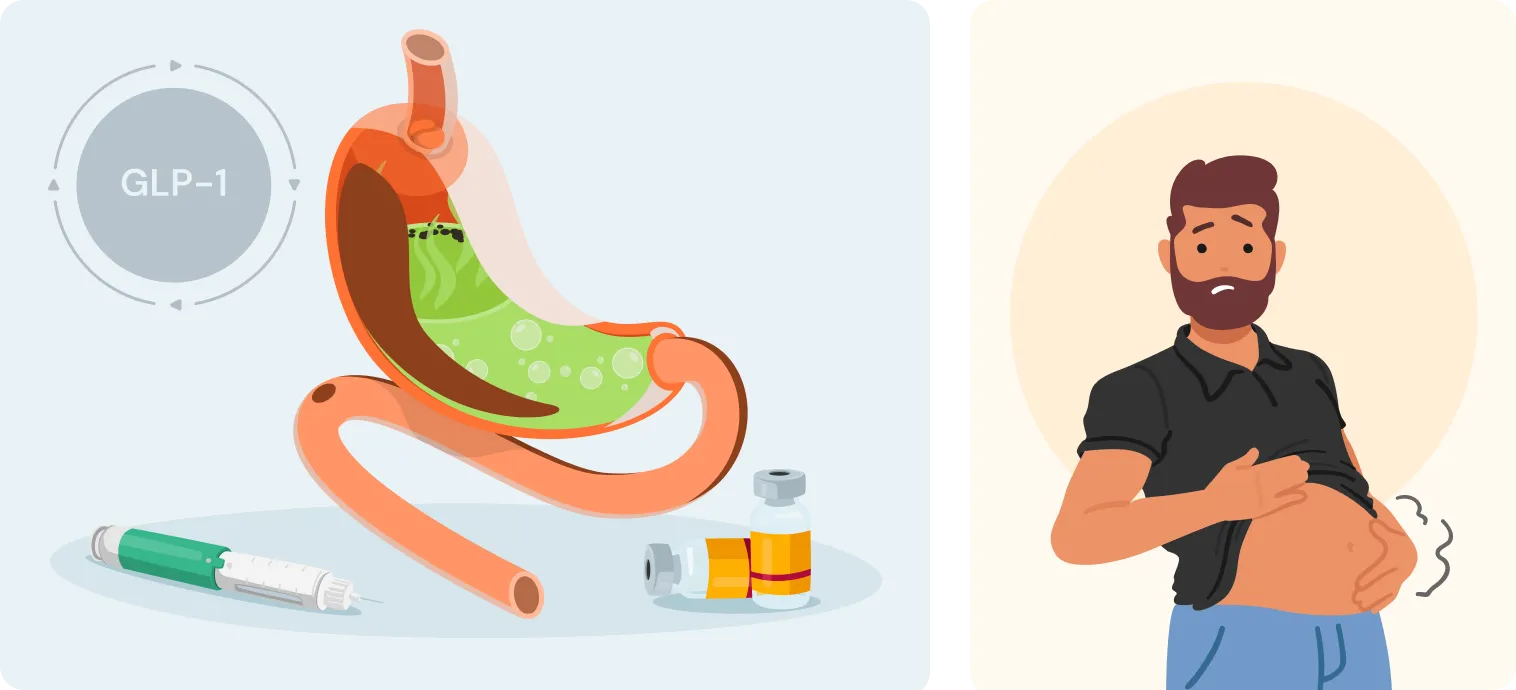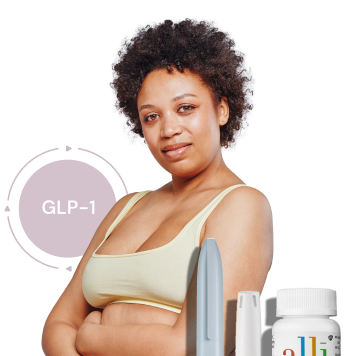Indigestion from GLP-1 injections, along with heartburn and general stomach discomfort, can be troublesome side effects of weight management and diabetes medications such as semaglutide (Wegovy) and tirzepatide (Mounjaro). These digestive symptoms are amongst the most commonly reported issues with GLP-1 receptor agonist injections, particularly during the initial weeks of treatment or after dose increases.
If you’ve been experiencing that uncomfortable burning sensation in your chest, stomach pain after eating, or persistent bloating since starting your GLP-1 medication, read through this comprehensive information to understand why indigestion from GLP-1 injections occurs, and what you can do about it.

What is indigestion from GLP-1 Injections?
Also known as dyspepsia, indigestion refers to a mix of digestive symptoms that typically affect the upper abdomen. With GLP-1 medications, these symptoms are directly related to how the drugs affect your digestive system.
Common indigestion symptoms
- Burning sensation in the chest or upper stomach (heartburn)
- Stomach pain or discomfort, especially after eating
- Feeling excessively full after small meals
- Bloating and abdominal distension
- Belching, excessive burping, or sulphur burps
- Acid reflux or regurgitation
- Nausea accompanying stomach discomfort
- Early satiety (feeling full quickly)
GLP-1-related indigestion often presents differently from typical indigestion because it’s closely tied to the medication’s effects on gastric emptying and digestive motility. Symptoms may be more pronounced after eating and can last longer than usual indigestion episodes.
Why Do You Experience Indigestion from GLP-1 Injections?
GLP-1 injections aid in weight loss and blood sugar control by slowing gastric emptying, which means food stays in the stomach for longer. This helps you feel full with less food, but it can also disrupt digestion and increase pressure in your upper abdomen, triggering indigestion.
Main causes:
- Delayed digestion: Food sits longer in the stomach, leading to pressure, discomfort, and reflux
- Reduced stomach motility: Less movement means slower transit and more pooling of food and acid
- Acid disruption: Eating less frequently and in smaller amounts may affect your body’s acid production rhythm
- Dietary changes: New eating patterns, unfamiliar foods, or eating quickly can all contribute
- Individual factors: Some people are simply more sensitive—especially those with a history of GERD, IBS, or reflux
Timeline and Patterns
Indigestion from GLP-1 medications typically follows these patterns:
- Week 1-2: Initial symptoms as your digestive system adjusts
- Weeks 2-4: Symptoms often peak during dose increases
- Weeks 4-8: Gradual improvement as your body adapts
- 8+ weeks: Most people experience significant symptom reduction
Common triggers for indigestion episodes
- Starting treatment or increasing doses
- Eating larger portions than your slowed stomach can handle
- Consuming fatty, spicy, or acidic foods
- Lying down soon after eating
- Drinking large amounts of fluid with meals
- Eating late in the evening
Managing and Preventing Indigestion
Smart Eating Habits:
- Eat smaller, more frequent meals – try 4–6 mini meals a day
- Stop when comfortably full – even if your portion seems small
- Avoid meals 2–3 hours before bed – to reduce overnight reflux
- Chew slowly and thoroughly – support your body’s digestion
- Sit upright while eating and for 30 minutes after
Food Tips:
- Choose simple, well-cooked foods – lean proteins, rice, steamed veg
- Avoid or limit fried, spicy, or acidic foods
- Cut back on fizzy drinks, caffeine, and alcohol
- Separate food and fluids – drink between meals instead of with them
Lifestyle Adjustments:
- Go for gentle walks after meals – movement helps digestion
- Sleep with your head elevated – use a wedge or extra pillows
- Wear loose clothing – to reduce pressure on your stomach
- Manage stress – anxiety can worsen digestive symptoms
Soothing Options for Relief
Natural remedies
- Ginger tea – helps reduce nausea and bloating
- Chamomile – may calm the stomach and nerves
- Warm compress – on your stomach can ease discomfort
Over-the-counter support
- Antacids – for quick relief from heartburn or acid reflux
- H2 blockers or PPIs – for ongoing acid symptoms (check with a pharmacist)
- Simethicone – for relief from gas and bloating
When to Seek Professional Help
Speak to your GP or pharmacist if you experience:
- Ongoing indigestion that affects your appetite or sleep
- Persistent nausea or vomiting
- Unexpected or rapid weight loss
- Blood in vomit or stools
- Chest pain or difficulty swallowing
They may recommend adjusting your dose, trying acid-reducing medication, or referring you to a gastroenterologist.
Never stop your GLP-1 treatment without professional advice. Most digestive side effects can be managed with support.
Frequently Asked Questions
Is indigestion a common side effect of GLP-1 medications?
Yes, digestive symptoms including indigestion, heartburn, and stomach discomfort are amongst the most commonly reported side effects of GLP-1 medications, affecting a significant number of people, particularly early in treatment.
Will the indigestion improve over time?
For most people, yes. Indigestion symptoms typically improve as your body adjusts to the medication, usually within 4-8 weeks. However, some people may need ongoing dietary modifications to manage symptoms effectively.
Can I take antacids whilst on GLP-1 medications?
Generally, yes. Over-the-counter antacids are usually safe to use with GLP-1 medications for occasional indigestion relief. However, speak to your pharmacist about regular use or if you need stronger acid-reducing medications.
Should I avoid certain foods completely?
You don’t necessarily need to eliminate foods permanently, but identifying and temporarily avoiding trigger foods can help manage symptoms whilst your body adjusts. Common triggers include spicy, fatty, acidic, or heavily seasoned foods.
Is it normal to feel full after just a few bites?
Yes, this is a common effect of GLP-1 medications due to delayed gastric emptying. The key is to listen to your body’s signals and stop eating when you feel comfortably satisfied, even if the portion seems small.
Can stress make GLP-1 indigestion worse?
Absolutely. Stress can worsen digestive symptoms and may make you more sensitive to the effects of delayed gastric emptying. Managing stress through relaxation techniques, adequate sleep, and gentle exercise can help improve symptoms.
Should I stop my medication if indigestion is severe?
Never stop your medication without consulting your healthcare provider first. Severe indigestion may require medical evaluation to rule out other conditions, and there are often effective ways to manage symptoms whilst continuing treatment.


























